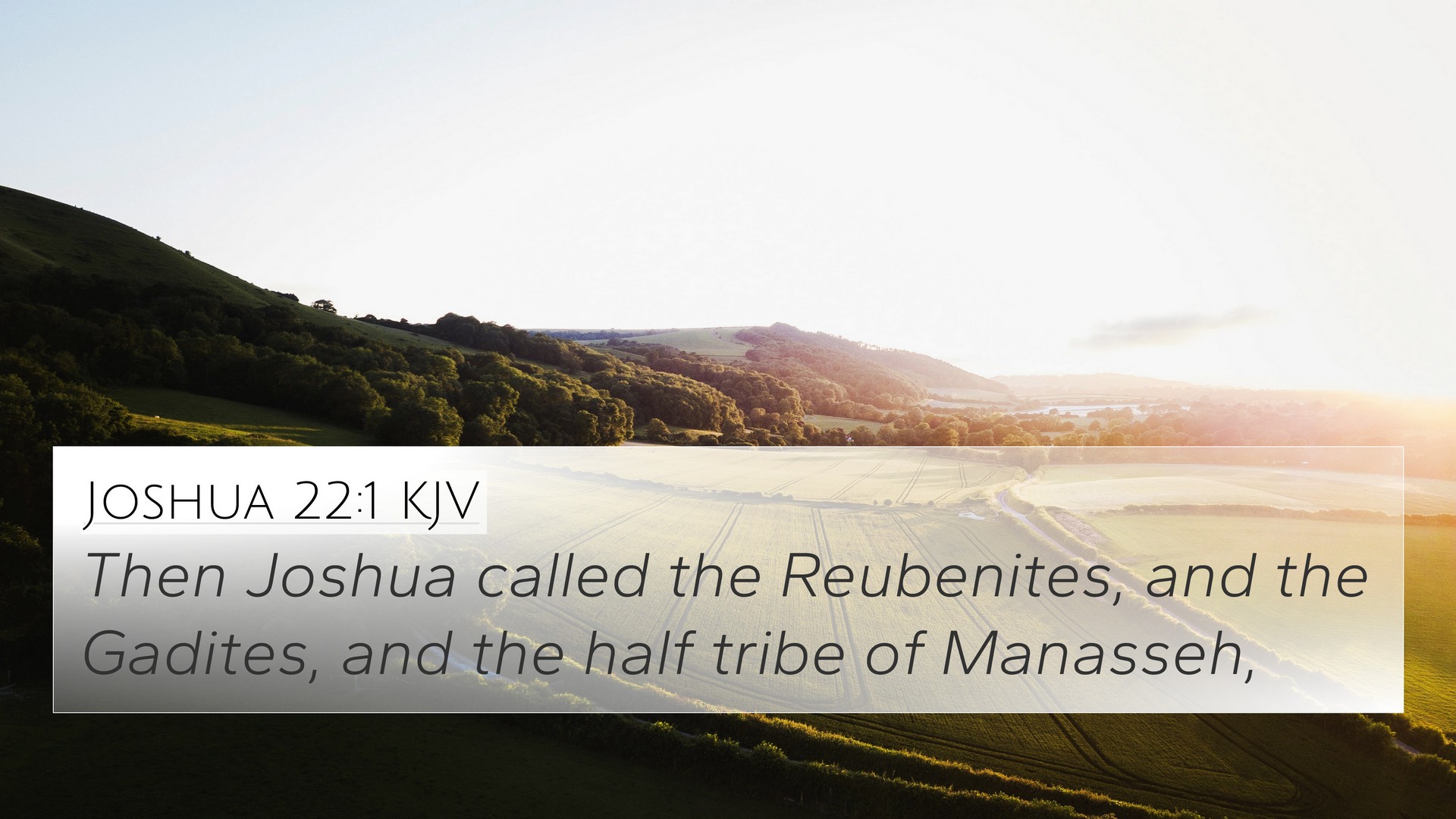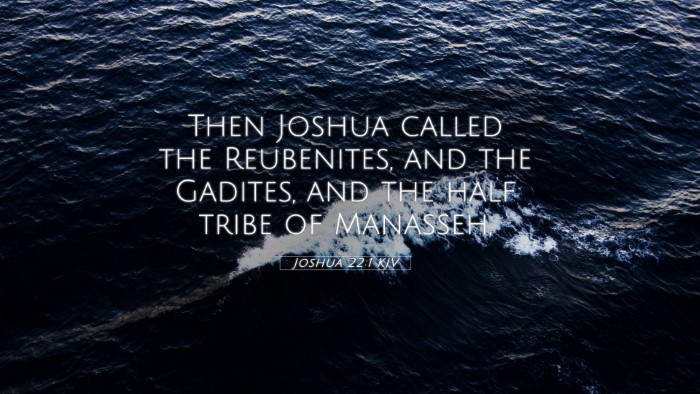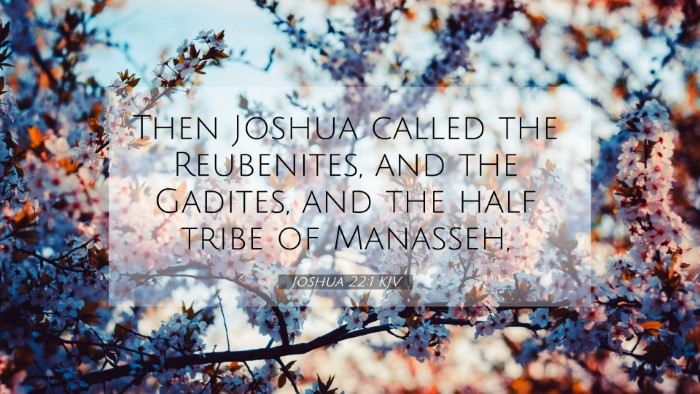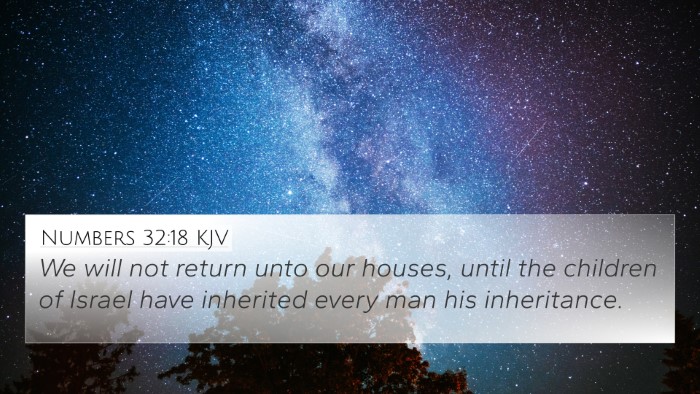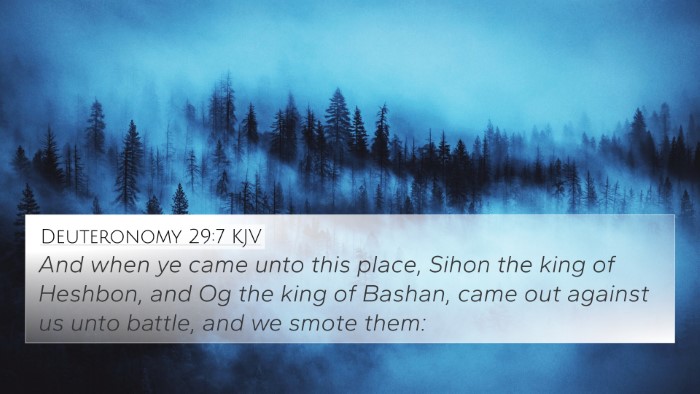Understanding Joshua 22:1
Context and Significance: Joshua 22:1 marks a pivotal moment as the Israelite tribes are addressed by Joshua after they have successfully settled in the Promised Land. This verse is significant for understanding the transition from conquest to settlement and highlights themes of faithfulness, obedience, and community responsibility within the nation of Israel.
Verse: "Then Joshua summoned the Reubenites, the Gadites, and the half-tribe of Manasseh."
Thematic Insights
- Leadership and Communication: Joshua, as a leader, exemplifies the importance of guiding his people. This section emphasizes how effective leadership requires direct communication with the tribes, ensuring that all voices are heard and instructions are clear.
- Tribal Identity: The reference to specific tribes—Reuben, Gad, and the half-tribe of Manasseh—underscores the significance of tribal identity in Israelite society, illustrating the dynamic of community responsibilities.
- Transition of Roles: This moment reflects a significant transition—from military action to peaceful settlement—emphasizing the role of covenantal fidelity in maintaining their newfound possession.
Commentary Insights
Matthew Henry: Henry describes this moment as a necessary communication to the tribes, praising their work and urging them to remember the covenant with God. He reflects on the importance of unity among the tribes and how they must collectively adhere to their commitments to God as they settle into their land.
Albert Barnes: Barnes highlights the significance of Joshua's calling of the tribes, noting it represents Joshua's recognition of their service and bravery in the battles fought. He emphasizes the model of gratitude and the necessity for remembrance of their commitments to one another and God.
Adam Clarke: Clarke expands on the cultural context, explaining that this gathering reflects the communal nature of Israelite society. He notes that the tribal structure was not just a means of organization but pivotal in fulfilling God's promises through cooperative effort.
Cross-Referencing Related Scriptures
To gain a deeper understanding of Joshua 22:1, consider the following related Bible verses that provide additional insight:
- Numbers 32:1-5: The initial request of the tribes to settle on the eastern side of the Jordan, revealing their intentions and the circumstances surrounding their inheritance.
- Joshua 1:12-15: A reaffirmation of the commitment made to the Transjordan tribes prior to the conquest of Canaan, highlighting their role in the military campaigns.
- Hebrews 11:32-33: References the faithfulness of these tribes, linking them to the overarching theme of faith in God's promises throughout the Bible.
- Deuteronomy 3:12-20: Discusses the allocation of land to the tribes, setting the stage for their settlement and responsibilities.
- Joshua 12:1-6: Reviews the conquests of Israel, providing context for the subsequent settlement and the importance of their victories.
- Matthew 28:19-20: Connects the concept of commanding and guiding a community in terms of faith and obedience, echoing Joshua's leadership in a New Testament context.
- Acts 10:34-35: Reflects on God's impartiality and the community responsibility followers of Christ have, similar to that of the Israelites under Joshua.
Conclusion
Joshua 22:1 serves as a touching reminder not only of the historical context of Israel's settlement but also of themes of leadership and collective memory. By examining this verse in connection with neighboring texts, we can observe a rich tapestry of Biblical principles that speak to cooperation, faithfulness, and the reaffirmation of community responsibilities—essential for believers today.
More Insights on Cross-Referencing
For further exploration, consider tools for Bible cross-referencing. Using a Bible concordance or cross-reference guides can significantly enhance your study experience. Understanding how to use Bible cross-references will help you find connections between scripture, supporting deeper insights into the themes presented in each passage.
Learning to identify connections between the Old and New Testaments enriches the understanding of God's continuous work through His people. Whether studying Pauline epistles or exploring the teachings of the Prophets in relation to Apostolic writings, cross-referential studies reveal the integrated narrative of the Bible.
In summary, as you meditate on Joshua 22:1, take time to reflect on the surrounding contexts and engage with the narrative of Scripture that interweaves themes of dedication, leadership, and covenant throughout the entirety of the biblical text.
